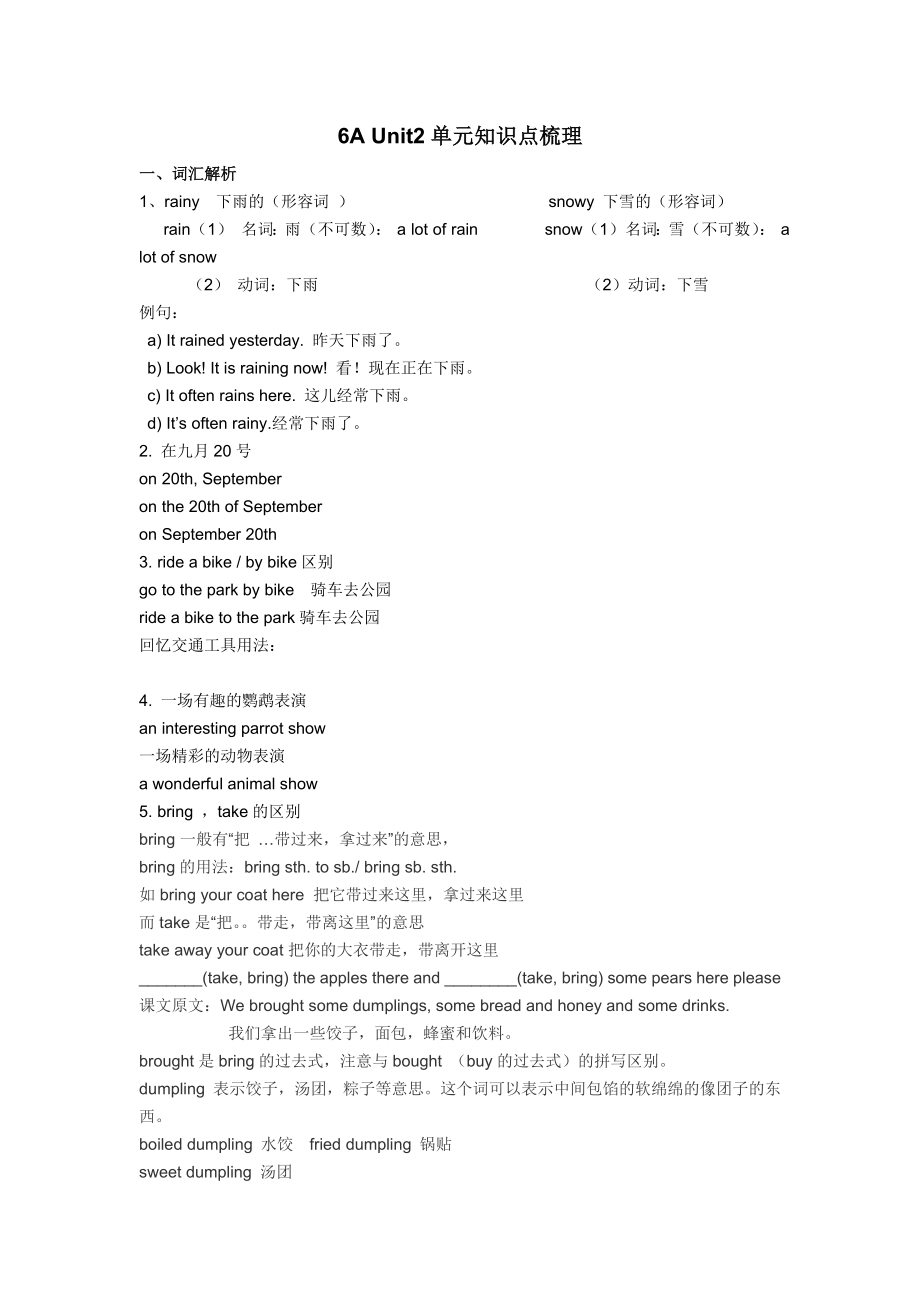《六年級(jí)上冊(cè)英語(yǔ)素材-Unit2 what a day 單元知識(shí)點(diǎn)梳理 譯林版》由會(huì)員分享,可在線閱讀�����,更多相關(guān)《六年級(jí)上冊(cè)英語(yǔ)素材-Unit2 what a day 單元知識(shí)點(diǎn)梳理 譯林版(3頁(yè)珍藏版)》請(qǐng)?jiān)谘b配圖網(wǎng)上搜索�。
1�����、6A Unit2單元知識(shí)點(diǎn)梳理
一、詞匯解析
1��、rainy 下雨的(形容詞 ) snowy 下雪的(形容詞)
rain(1) 名詞:雨(不可數(shù)): a lot of rain snow(1)名詞:雪(不可數(shù)): a lot of snow
(2) 動(dòng)詞:下雨 (2)動(dòng)詞:下雪
例句:
a) It rained yesterday. 昨天下雨了。
b) Look! It is raining now! 看����!現(xiàn)在正在下雨。
c) It often rain
2����、s here. 這兒經(jīng)常下雨���。
d) It’s often rainy.經(jīng)常下雨了。
2. 在九月20號(hào)
on 20th, September
on the 20th of September
on?September?20th
3. ride a bike / by bike區(qū)別
go to the park by bike 騎車去公園
ride a bike to the park騎車去公園
回憶交通工具用法:
4. 一場(chǎng)有趣的鸚鵡表演
an interesting parrot show
一場(chǎng)精彩的動(dòng)物表演
a wonderful animal
3�����、show
5. bring ���,take的區(qū)別
bring?一般有“把 …帶過(guò)來(lái),拿過(guò)來(lái)”的意思�,
bring的用法:bring sth. to sb./ bring sb. sth.
如?bring?your?coat?here??把它帶過(guò)來(lái)這里�,拿過(guò)來(lái)這里
而take?是“把�����。���。帶走�����,帶離這里”的意思
take?away?your?coat?把你的大衣帶走,帶離開(kāi)這里
_______(take, bring) the apples there and ________(take, bring) some pears here please
課文原文:We brought
4�、some dumplings, some bread and honey and some drinks.
我們拿出一些餃子�����,面包����,蜂蜜和飲料���。
brought是bring的過(guò)去式,注意與bought (buy的過(guò)去式)的拼寫(xiě)區(qū)別����。
dumpling 表示餃子,湯團(tuán)���,粽子等意思。這個(gè)詞可以表示中間包餡的軟綿綿的像團(tuán)子的東西�。
boiled dumpling 水餃 fried dumpling 鍋貼
sweet dumpling 湯團(tuán)
rice dumpling 粽子
honey 蜂蜜 bee 蜜蜂
hard drink 烈酒 soft drink 軟飲料
6.
5、 see的用法
see sb doing sth. 看到某人正在做某事
see sb. do sth. 看到某人做某事
類似的詞還有watch , hear, notice, look at
我每天看見(jiàn)你做作業(yè)��。
我昨天看見(jiàn)你正在做作業(yè)�。
2. It was sunny in the morning. 在早晨天氣是晴朗的.
這是用來(lái)描寫(xiě)天氣的過(guò)去時(shí)的句型�����,表示天氣的形容詞一般由其相對(duì)應(yīng)的名詞或動(dòng)詞變化而來(lái)。如:sun --- sunny
6���、 cloud --- cloudy wind --- windy rain --- rainy
3. The weather became windy and cloudy. 天氣變得既有風(fēng)又多云了��。
這里became是become的過(guò)去式,譯為“變得”��,是系動(dòng)詞�,用于修飾形容詞�,即系動(dòng)詞+ 形容詞�,另外我們學(xué)過(guò)的系動(dòng)詞還有be、get��、look
如:It was rainy yesterday. 昨天是個(gè)下雨天�����。
You look sad. 你看起來(lái)傷心���。
In autumn, the days get shorter. 秋天�����,白天時(shí)間變得短
7���、了���。
4. It was time for lunch. 該吃午飯的時(shí)候了�����。
這是It’s time for ?…句型的過(guò)去時(shí)表達(dá)����,另外表示“該…的時(shí)候了”還可以用it’s time to.
It’s time for …后面跟名詞或動(dòng)名詞, It’s time to…后面跟動(dòng)詞原形�����,兩者可以互換��,如上述句子可以轉(zhuǎn)化為It was time to have lunch. 再如:
It’s time for school. 相當(dāng)于 It’s time to go to school.
It’s time for class. 相當(dāng)于 It’s time to have
8���、 a class.
5. There was a parrot show in the park. 在公園有一個(gè)鸚鵡表演。
在這個(gè)句子中�����,show是名詞���,意為“展示,演出”�。之前,我們學(xué)過(guò)show是動(dòng)詞�����,意為“出示”。如:Liu Tao showed his pictures to his friends. 劉濤把他的畫(huà)給他的朋友們看。
我們學(xué)過(guò)類似的單詞還有:watch(n. 手表, v. 觀看)�, play(n. 戲劇, v. 玩,玩耍)����,rain(n. 雨, v. 下雨)�����, park(n.公園, v. 停車)�����, fly(n. 蒼蠅, v. 飛)…, 如:
There is
9、 a lot of rain in our city. 我們城市雨水很多�����。
It is raining now. 現(xiàn)在在下雨�。
Can I park my car in the park? 我能把車停在公園里嗎�?
Grammar: 一般過(guò)去時(shí):
寫(xiě)出下列動(dòng)詞的過(guò)去式
is\am_________ fly_______ plant________ drink_________ pass_______
play_______ go________ make ________ does_________ dance________
worry________
10�����、 eat__________ put ______ meet________ kick_________
用動(dòng)詞的適當(dāng)形式填空����。
1. It _____ (be) the 2nd of November yesterday. Mr White ________ (go) to his office by car.
2. Gao Shan ________ (put) the book on his head a moment ago.
3. Don’t ______ the house. Mum _______ it yesterday. (clean)
4.
11���、What ____ you ______ just now? I _______ some housework. (do)
5. They _________ (make) a kite a week ago.
6. I want to ______ apples. But my dad _______ all of them last month. (pick)
7. _______ he ______ the flowers this morning? Yes, he _____. (water)
8. She ____ (be) a pretty girl. Look, she _____ (do) Chinese dances.
9. The students often _________ (draw) some pictures in the art room.
 六年級(jí)上冊(cè)英語(yǔ)素材-Unit2 what a day 單元知識(shí)點(diǎn)梳理 譯林版
六年級(jí)上冊(cè)英語(yǔ)素材-Unit2 what a day 單元知識(shí)點(diǎn)梳理 譯林版

